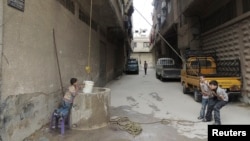A cholera outbreak is feared in coming months in Syria, where other waterborne diseases such as hepatitis A and typhoid are on the rise because of poor sanitation, the World Health Organization warned Tuesday.
The level of safe drinking water is about one-third of the amount that existed before the conflict erupted nearly five years ago, and supplies are cut off to punish civilians at times, WHO said.
Syria recorded 31,460 cases of hepatitis A last year, and more than 1,000 cases have been reported per week since January, said Dr. Elizabeth Hoff, WHO representative in Syria.
"This normally we see when the weather is warmer and so on. But it just tells you people no longer have the same access to safe drinking water as before,'' Hoff told reporters. ''Water has been used for political dividends and has been turned off to certain areas, and that leads people to drink water from unsafe areas."
Cholera, an intestinal infection often linked to contaminated drinking water, causes severe diarrhea and vomiting, leaving small children especially vulnerable to death from dehydration, according to the U.N. health agency.
Infectious diseases thrive where conditions are crowded and hygiene is poor. The WHO appealed for $116 million to provide medicines and health care to 12.2 million people across Syria this year.
Some 25,000 people are wounded each month, requiring surgical supplies, safe blood transfusion and anesthetics, it said. On Sunday, WHO delivered critical medicines and supplies to the eastern part of Aleppo.
More than 2.7 million people live in areas controlled by the Islamic State group, whose forces have sought some medicines from the WHO through nongovernmental organizations, although the Syrian Arab Red Crescent delivers more aid, Hoff said. A further 4.8 million people live in areas that are inaccessible because of fighting, she said.
''We are moving toward a worse situation," and some areas are under siege, she said. As examples, she pointed to Deir al-Zor city, with a population of 150,000; Moadimiya, a Damascus suburb of 35,000; and Mharda, a government-held town of 10,000 in Hama province.





